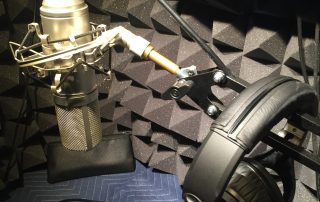10 Tips for Successful Online Casting
The world of online casting – sometimes referred to as pay-to-play – became a somewhat controversial topic in 2017. Although not all voice actors utilize it, almost everyone has an opinion about it and many voice actors swear by it.
I happen to be one who endorses the usage of online casting and recently I had the pleasure of learning many useful tips and techniques from one of the industry’s most successful talents, J. Michael Collins. Thanks to Anne Ganguzza and VO Peeps, J. Michael was able to bring his knowledge and insight of online casting to a group of voice actors eager to learn more about succeeding in this ever-expanding part of the industry.
If you’re new to voiceover, you might not realize that prior to about ten years ago, there were no online casting sites specifically for voiceover jobs. “Back in the day,” voice actors had to have agents who let them know about casting opportunities and actors had to go to a specific studio and audition in person. Home studios were unheard of until the advent of the internet and of course, the rest is VO history….
Now that home studios and voice actors are ubiquitous, online casting is a great way for talent to be heard and hired directly by clients and production companies around the world. For those new to the industry, it’s a great way to slowly build a body of work and to increase your voice over experience.
Here are some great tips from J. Michael Collins that really stood out:
- Online casting is a numbers game. You’ve got to “throw a lot of mud” against the wall to make some of it stick so a minimum of 20 auditions per day is a great way to start.
- Being early does matter therefore, efficiency is important. With practice, you should be able to submit 10-15 auditions an hour.
- Compose a form response to use on your auditions – don’t waste time with custom response for each audition. Oftentimes the person who posted the audition is not the person who listens to the responses.
- Each audition should be from 15 to 30 seconds max. If there is more than 30 seconds of copy, try to get in an open, hook, brand name and sentence that closes.
- The more people who hear you, the more jobs you’ll book – it’s that simple!
- The “6-second” rule applies – that about how long you have to get the listeners attention so the delivery of your first line is very important.
- Make sure you have enough energy in your delivery. Most of us think we have more energy in the delivery than other people do when listening – so bump it up!
- Make the listener “like you.”
- Obsess about the audio, not about the editing.
- It’s okay to leave in “natural” breaths as many creative directors like the audio somewhat raw.
Some of his other pearls of wisdom included:
- Voices are like entrée choices in a restaurant. Think of your voice as a “salmon entrée.” Some people don’t like salmon, they like steak. In fact, about 93% of people don’t like salmon but there are people out there who do enjoy it and by reaching out and getting heard more and more, someone who likes your sound will connect with you.
- Don’t be discouraged if a project already has 50 or 60 submissions. While it is best to be early, keep in mind that approximately 80% of the auditions are disqualified immediately (40% technical issues/40% performance issues) so if the project “speaks” to you, submit. You’re probably actually only competing against 10 to 15 individuals.
- Tag every category made available by the specific casting website and upload a demo for each category as well.
Thanks again to the VO Peeps for providing the opportunity to get J. Michael’s great insights and experience regarding online casting. Audition away!!






